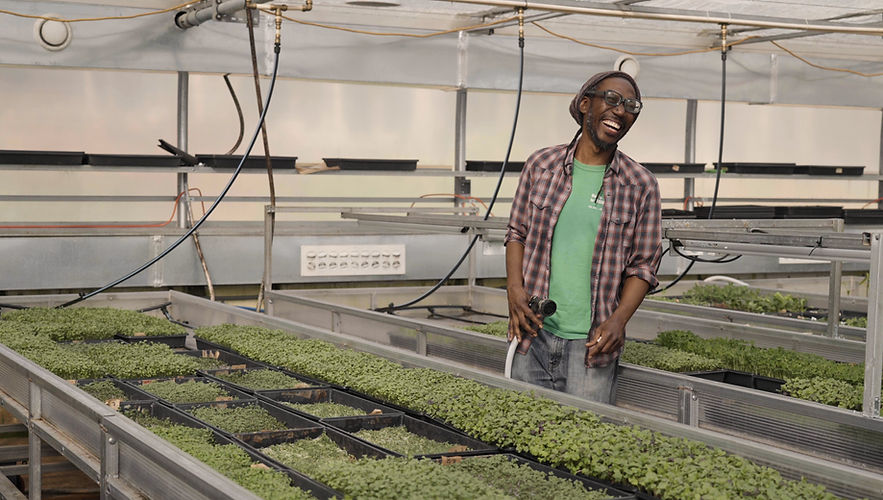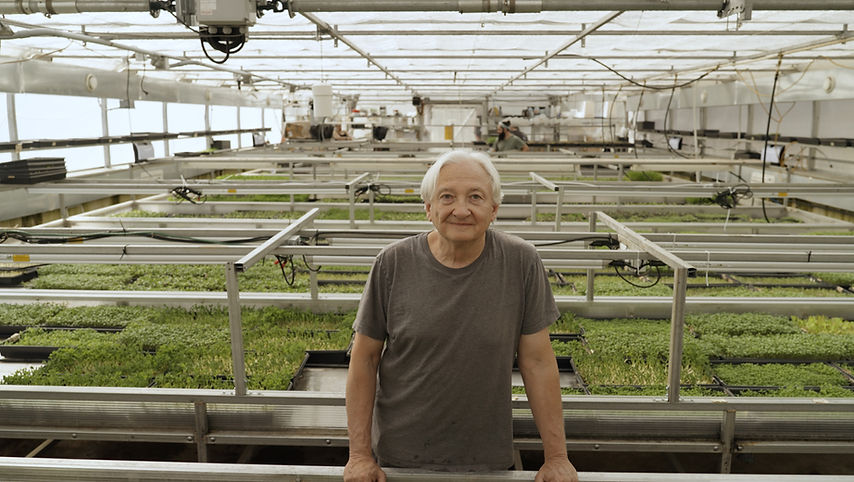
To fight climate change and feed the world, we’re reinventing the way we grow food.
Net zero energy. No carbon footprint.
Local, organic, nutritious crops to build resilient communities.
We’d like to share it.
FutureFarm
Experience FutureFarm
Film by Art Jones • Great Jones Productions
The Problem
Conventional agriculture generates about 10% of U.S. greenhouse gas directly, with significant additional impacts related to long-distance shipping. It also reduces the nutritional value of our food and locates jobs and economic resources far from our local communities. As a response, North American greenhouse food production has been growing at a rate of 12% annually. But these conventional greenhouses also require significant fossil fuel consumption. They generate greenhouse gases. How can we feed ourselves without increasing climate change?
FutureFarm: A Solution
We’ve created a year-round greenhouse technology that uses 10% of the energy that would normally be used in conventional greenhouse production – and all of that energy is produced using solar and geothermal sources.
We grow nutrient-dense USDA Certified Organic crops in a greenhouse created in cooperation with New York State, area farmers, chefs and scientists. We’ve spent 10 years building and proving our business model and our tech, and we can produce 30,000 pounds of crops a year in 3000 square feet of production area.
We know what the challenges are in local farming, because we are farmers ourselves.


Building Local Communities and Economies
Our greenhouse model offers an economic generator for small towns and cities. It can be built in or near large population centers, helping to create a secure local food network with healthy, highly-nutritious organic produce. Our greenhouse creates good-paying year-round jobs, particularly for communities where agriculture employment is seasonal. Future Farm is a proven, sustainable model for economic and community development, with no carbon footprint.

We're Ready to Share Our Model
Our FutureFarm greenhouse offers a model for change that can be replicated across New York State, the Northeast, and the U.S. It can be built almost anywhere, and notably in areas with poor soil and extreme weather. Best of all, our technology is open source. We’re committed to transferring it to forward-looking individuals and organizations that can put FutureFarm to work for the greater benefit of all, and for generations to come. We seek collaboration with colleges and university agricultural extensions, with farmers and business owners, and with government agencies working to offset greenhouse gases.
Fighting Climate Change, One Farm at a Time
Each FutureFarm greenhouse can:
• Mediate the effects of 50 tons or more of carbon dioxide per year
• Offset significant amounts of nitrous oxide and sulfur dioxide
• Reduce groundwater irrigation requirements by 100%
• Reduce rainwater irrigation water requirements by 80%
• Consume zero groundwater resources to heat, dehumidify and cool

About Michael McDonough
Architect, Farmer, Creator of FutureFarm
Tongore Brook Farm: www.tongorebrook.com
Email: info[at]michaelmcdonough.com
Michael McDonough AIA is an architect and farmer, and a lifelong student of the relationship between buildings, energy, and the environment. He first conceived his idea of how we will feed ourselves in an uncertain future in 1999, envisioning small farms serving their local communities, with 90% energy savings using solar and geothermal-powered greenhouses for climate resilience. As an award-winning architect educated at the University of Massachusetts, MIT and University of Pennsylvania, Michael specializes in environmentally appropriate systems and advanced building technologies. He consults on zero-energy/zero-carbon policy, has designed offices, airports, farms and multi-family residences, and has published two books and over 80 articles on architecture and design.
About Art Jones
Director, "FutureFarm" Film, Great Jones Productions
www.great-jones.com
Email: info[at]great-jones.com
Art Jones is a writer, director and producer at Great Jones Productions in New York, making films to move people and make change. He and his team fuse vivid storytelling with active community building to advance social justice and bold models for change.
"When I observed FutureFarm in action, I immediately saw a model for change that had to be shared with a world in desperate need of solutions. Like many people, I fear the growing dangers of global warming. I also see an ever-growing world of people in cities and towns who need to be fed.
Michael's ingenious and straightforward solution does the heavy lifting of actually fighting climate change and growing the nutritious food we need to build healthy local communities. During filming, I saw how this remarkable greenhouse could be implemented almost anywhere. This open source, ready-to-share solution is actionable now."
News of FutureFarm
-
FutureFarm featured in "Building Healthy Communities" case study by U.S. CDC / ATSDR to aid local communities in building needed food sovereignty while fighting climate change.
-
FutureFarm team joins BROWN, a national coalition of experts and organizations working hands-on with embattled local communities to redevelop brownfields, create healthy land reuse and build resilience.
-
Smithsonian Institution: Michael McDonough co-authors report with national experts exploreing FutureFarm's protection of land and forest, using only 10% of acreage for farming, preserving 90% of natural landscape and ecosystem.
-
FutureFarm receives $22,000 grant from USDA in its work to rebuild the health of locat forests. Project explores better management of forests damaged and disrupted by climate change and FutureFarm's role in a larger forestry master planning.
-
FutureFarm team engages with Oneida Indian Nation in New York to bring net zero energy greenhouse and greater food soveignty to triblal communities.
-
FutureFarm partners with Northern Arizona University's Office of Native American Initiatives to share project and planning with native tribes.
FutureFarm Consutling
Innovative Climate Neutral Greenhouse Solutions
FutureFarm is open source innovation. We'd like to share it. FutureFarm provides sustainable greenhouse design and consulting services for educational institutions, businesses, brownfield developers, underserved communities, and Native American Tribal Lands. Located in New York's Hudson Valley and headed by award-winning architect Michael McDonough, we work with private developers, government agencies, and non-profits. FutureFarm specialize in year-round local food production, food security, and job creation in agriculture internationally.
